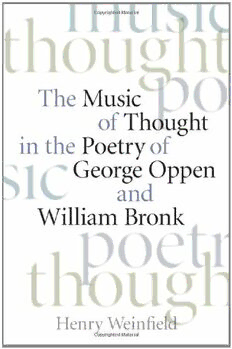
The music of thought in the poetry of George Oppen and William Bronk PDF
Preview The music of thought in the poetry of George Oppen and William Bronk
The Music of Thought in the Poetry of George Oppen and William Bronk The Music of Thought in the Poetry of George Oppen and William Bronk Henry Weinfield University of Iowa Press | Iowa City University of Iowa Press, Iowa City 52242 Copyright © 2009 by the University of Iowa Press www.uiowapress.org Printed in the United States of America Design by April Leidig-Higgins No part of this book may be reproduced or used in any form or by any means without permission in writing from the publisher. All reasonable steps have been taken to contact copyright holders of material used in this book. The publisher would be pleased to make suitable arrangements with any whom it has not been possible to reach. The University of Iowa Press is a member of Green Press Initiative and is committed to preserving natural resources. Printed on acid-free paper lccn: 2008933514 isbn-13: 978-1-58729-781-6 isbn-10: 1-58729-781-7 09 10 11 12 13 C 5 4 3 2 1 contents Acknowledgments vii Introduction 1 one Oppen, Bronk, and the Story behind “A Narrative” 11 two Because the Known and the Unknown Touch: A Reading of Oppen’s “Of Being Numerous” 35 three In the Drift of the World: A Reading of Bronk’s Life Supports: New and Collected Poems 107 four Oppen’s Reoccupation of Traditional Lyric in “Eclogue,” “Psalm,” and “Ballad” 181 Afterword 199 Notes 207 Bibliography 223 Index 231 acknowledgments The publication of this book has been made possible in part by support from the Institute for Scholarship in the Liberal Arts (ISLA) in the College of Arts and Letters at the University of Notre Dame. I am also grateful for the grant from ISLA that I received that gave me the opportunity to travel to the University of California at San Diego to examine the Oppen papers there. I would like to thank the librarians of the UC–San Diego Special Collections for their help. Quotations from George Oppen’s New Collected Poems are used by kind permission of the New Directions Publishing Corporation. Quota- tion from the work of William Bronk is by permission of the Trustees of Columbia University in the City of New York. I am grateful to the Rare Book and Manuscript Library of Columbia University. I would like to thank David Clippinger, who is now in the process of editing William Bronk’s letters, most of which are now housed at Co- lumbia University, for his kindness in making some of the typescripts of the Bronk letters available to me. I could not have written the chapter on Oppen without the magnificent edition of the poet’s letters edited by Rachel Blau DuPlessis and I am glad of this opportunity to thank her. My thinking on Bronk and Oppen has been enriched by the many friends and colleagues with whom I have had the benefit of conversations over the years. Let me mention some of them by name: Paul Auster and Michael Perkins, with whom I conducted the taped conversation with Bronk that appeared in a special issue of Sagetrieb devoted to the poet; Burt Kimmelman, who coedited that issue; Michael Heller, the author of the first book on the Objectivists, Conviction’s Net of Branches, and of many articles on Oppen and Bronk; Louise Chawla and John Ernest, whose work on Bronk has been important to me; and Michael Davidson, whose edition of Oppen’s New and Collected Poems has enriched our un- derstanding of the poet. I am grateful to the late Burton Hatlen (whose death was announced just as I was completing my labors) and to Marjorie Perloff, both of whom read and commented on the long Oppen chapter and from whose criticism I have greatly benefitted over the years. My friends and colleagues Stephen Fallon, Kevin Hart, David O’Connor, and Catherine Schlegel have enriched my intellectual life at Notre Dame, and I am grateful to Allen Mandelbaum, Paul Bray, and Robert Murphy for their friendship and intellectual companionship. I would like to express sincere thanks to my editor at the University of Iowa Press, Joseph Parsons, and to the managing editor, Charlotte Wright, who with kindness and efficiency shepherded this book through its various steps. Also, a special note of thanks goes to Blythe Woolston, indexer extraordinaire. When I was completing my revisions to this book, Peter Nicholls’s splendid study, George Oppen and the Fate of Modernism, appeared. I wish I could have taken a fuller account of it in these pages, but I am grateful, in any event, for a recent opportunity to discuss Oppen with Peter at the University of Sussex. I owe a special debt of gratitude to Ste- phen Fredman and Norman Finkelstein for the considerable time and effort they put into reading and commenting on the manuscript of this book at every stage of the process. As always, I am grateful to my friends Stuart Liebman and Lois Greenfield, and to my wife, Joyce, and our chil- dren Paul, Saralena, and Vera for their encouragement and love. Finally, I think of three poets who are now dead—Allen Kimbrell and two friends from my undergraduate days at CCNY, who introduced me to the work of Oppen and Bronk and shared the excitement of discovering their poetry with me: Ross Feld and Bradford Stark. It is to their memory, as well as to that of the poets George Oppen and William Bronk themselves, that I dedicate this book. acknowledgments viii The Music of Thought in the Poetry of George Oppen and William Bronk
